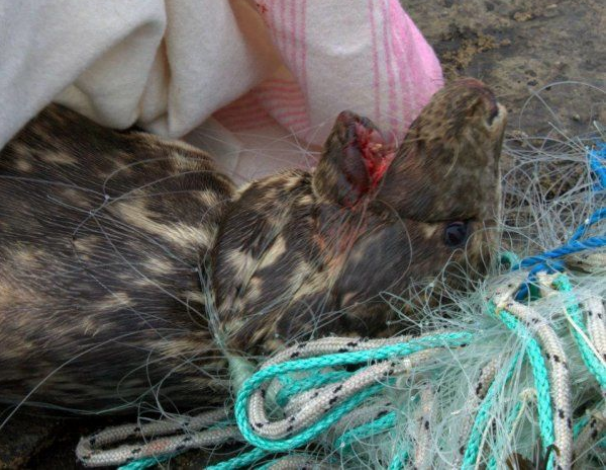Stop the Call to Cull Seals in Irish waters!
Recent calls for a cull of seals around Irish shores are a growing concern among conservationists. The commercial fishing industry is convinced that killing large numbers of seals is the only way to stop seals from damaging fish caught in their nets. Of course seals eat fish, and a fish caught in a net is an easy meal, any animal will take food that is easy to get. Fishermen are very happy to show fish with bites taken out of them but a dead fish in a net will attract not just seals but any scavenger nearby such as conger eels, crabs and lobsters. However seals appear at the surface to breath, so are the easy target to blame.
There is no doubt that seal numbers have increased in recent years, but is that a reason to kill them. In the Past illegal culls have taken place, the animals have suffered as these illegal culls have taken place without supervision and unsuitable firearms have been used. Seals have co-existed with humans for millennia, and while there has probably always been some conflict with people dependent on fishing for a living as seals are seen as competitors for the same resource. They have also contributed to our own heritage and folklore over the years and have every right to coexist with people.
Fishermen are well aware that people with no knowledge of the seas or fishing will sympathise with a big-eyed fluffy white coated seal pup. But anthropomorphism aside the question remains do seal numbers need to be reduced. In the early nineties the Phocine distemper virus (PDV) killed over 13,000 common seals in the North Sea. This did not result in an increase in fish stocks. So how many dead seals would the fishing industry like to see? The Irish Seal sanctuary sits on the Seal Depredation Group of the Marine Institute with industry and scientists. Attempting to resolve conflict between seals and fishermen. We are independent advocates for sustainable use of marine resources for all including fishermen.
Cod numbers fail to recover in the West of Scotland and seals are blamed, seals are not the only animals that eat cod, Mackerel and Herring will eat them at the larval stage but in that area Hake numbers have vastly increased over recent years following a collapse in the stock. Look at a Hakes mouth, it eats fish. To me this proves that an ecosystem approach to any fisheries problem must be considered.
I believe that before any management is even considered, we should know how many seals die each year in fishing gear. A seal taking a fish from a net puts itself in danger as if entangled there is a good chance it will drown. At the moment the industry refuses to keep records of how many marine mammals die in fishing gear. This despite requests to bring ashore any dead seals so they can be analysed by scientists. These are not landed but simply dumped at sea, with no record. When asked to land this bycatch the response was that some member of the public would witness and photograph it, and they know how unpopular killing seals is with the general public. What we do know is that not all these dead seals and dolphins wash ashore.
That depends on a number of factors such as how far out to sea was it thrown overboard. Marine scavengers are only too happy to eat anything dead they come across, sharks and even crabs can make fairly short work of a carcass before it gets close to shore.
In other words we have no idea how many marine mammals the industry kills on an annual basis as things are at present. In order to manage anything you must have the correct and complete data and numbers, talking about managing seal numbers without all the data is nonsense.
Young seals are particularly at risk from nets as they have to learn how to avoid getting stuck in nets they are also still growing and each year numbers show up with tight netting cutting into their necks as they grow. These are the ones that have broken free from the net, albeit with a piece of net forming a ligature cutting into them which will kill them in time if not removed. We need to know how many seals die each year before any management is considered.
The Irish Seal Sanctuary and Ocean Research & Conservation Ireland have consistently been opposed to any cull.
Distressing scenes like those in the photographs are all too common around our coastline. How many marine mammals die in nets each year. This needs to be answered before any form of management is considered. Remember seals are protected under EU and Irish Law.
SHARE THIS ARTICLE














